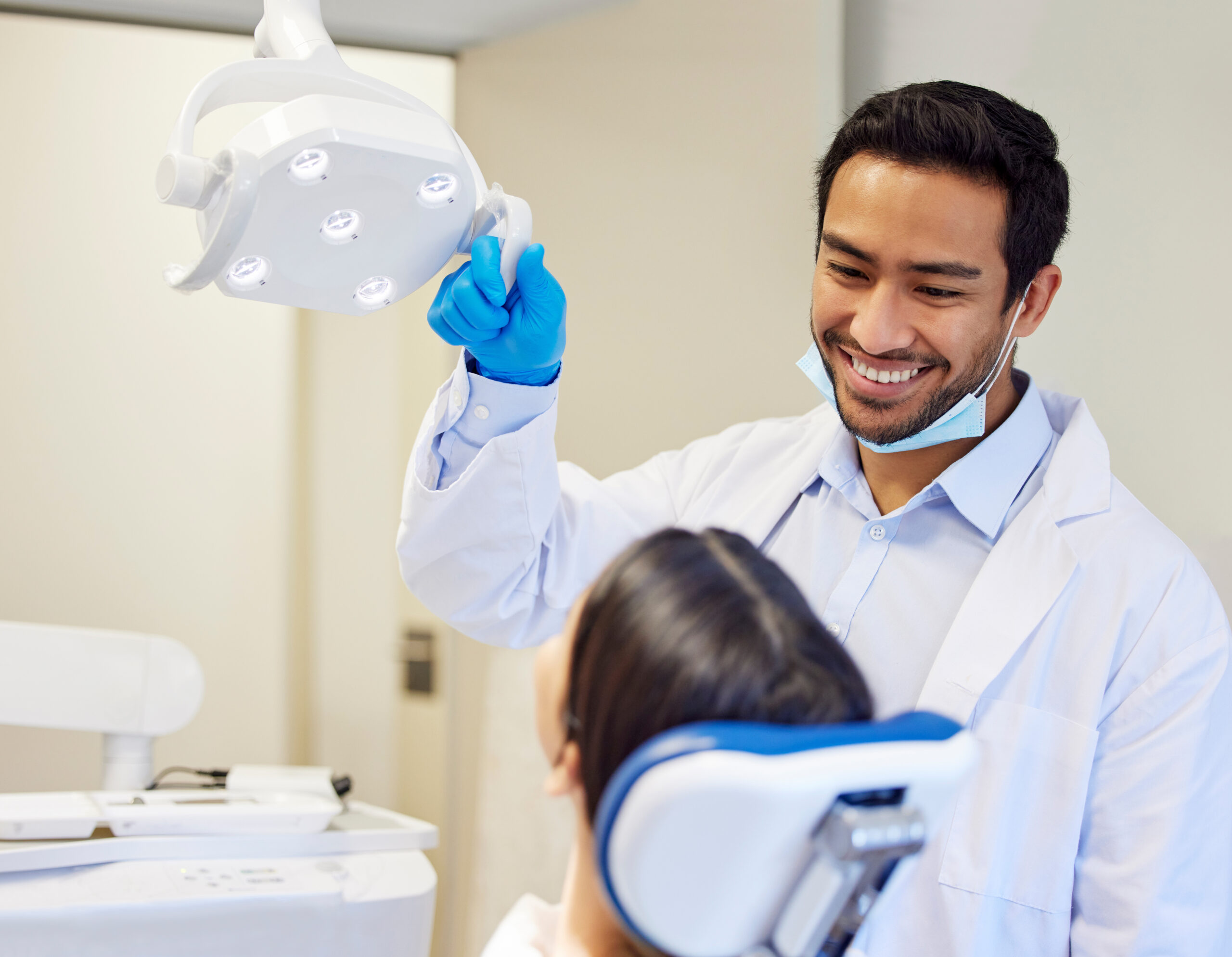
Thankfully, sedation dentistry is a solution that can help alleviate anxiety and make dental procedures more relaxing and comfortable. If you’re hesitant about exploring the option and are wondering if sedation is safe, the answer is, yes, sedation is safe when administered by an experienced provider.
What is Sedation Dentistry?
Sedation dentistry helps patients relax and feel at ease, so they can get dental care in a way that’s stress-free and painless. Often, sedation is mild to moderate and you’re awake during the procedure and able to answer questions and respond to commands.
For certain situations, deep sedation is an option too. What is deep sedation dentistry? It’s where general anesthesia is administered through an IV and you’re asleep throughout the entire dental procedure.
Sedation dentistry can be a good choice for patients with:
- Dental anxiety or a dental phobia
- A very sensitive gag reflex
- Apprehension about a specific treatment
- Special healthcare needs (cognitive, physical or behavioral) that are aggravated by stress or make it difficult to safely undergo dental procedures
- Significant dental concerns requiring extensive, lengthy treatment
- A decreased response to local anesthesia
What are the Different Types of Sedation?
The type of sedation we recommend depends on a number of factors, including:
- The type of dental procedure being performed
- How long the dental procedure will last
- Your anxiety levels
- Your overall health and the medications you take
While the specific sedatives used and the offerings can vary by practice, these are the ones we offer at our office:
- Nitrous Oxide
Nitrous oxide, or laughing gas, has been used in dentistry for over 100 years and is the most common type of sedation for kids, though it can be used for adults as well. The laughing gas is administered through a mask that covers your nose. You’ll breathe in a mixture of nitrous and oxygen and within a few minutes, you’ll feel calm and euphoric.
Your Naperville dentist controls the amount of nitrous oxide you get, so they can deliver mild or even moderate effects, depending on your needs. Nitrous oxide is a form of conscious sedation, meaning you’ll be awake during your treatment, though your senses will be dulled.
When the procedure is over, your dentist will have you breathe in pure oxygen to flush out the nitrous oxide. Laughing gas wears off just as quickly as it kicks in and has very few side effects, so you’ll be able to go back to school, work or daily activities after your appointment.
- Oral Conscious Sedation
If you choose oral sedation dentistry, your dentist will prescribe you an oral medication for reducing anxiety. Depending on the dosage, sedation can range from minimal to moderate. You’ll take the medication about an hour before your scheduled appointment.
During your dental procedure, as the name suggests, you’ll be conscious and able to follow instructions. However, you’ll feel comfortable and relaxed. In fact, it’s common for patients to fall asleep during their visit.
While side effects are generally minimal, you might feel sleepy after your appointment. And, because sedatives can impact your reaction time, you will need someone to drive you to and home from your visit.
- General Anesthesia / IV Sedation
For patients with severe dental anxiety or people undergoing oral surgical procedures, general anesthesia could be recommended. With this type of sedation, anesthesia is delivered through an IV and your vital signs are monitored throughout.
You’ll be unconscious and have no memory of the procedure when you wake up. After your procedure, you’ll recover for several hours at the office before leaving. You will need to have a responsible adult drive you home.
How Safe is Sedation Dentistry?
Nitrous oxide and oral conscious sedation both have very good safety profiles. Most patients experience little-to-no side effects. When you visit our practice for sedation dentistry in Naperville, we’ll perform a comprehensive exam and take a detailed health and medication history to ensure you’re a good candidate and there are no contraindications.
Our general dentists and specialists are licensed and trained in providing in-office sedation. And our state-of-the-art office is equipped with the latest technology and tools, so we’re able to carefully monitor your vitals throughout your procedure.
How safe is IV sedation for dental work? This type of sedation is also safe but it’s essential that the dental practice has the necessary monitoring equipment, trained personnel and an anesthesiologist on-hand. The facility should also be licensed to offer it.
At Naperville Dental Specialists, we always consider general anesthesia on a case-by-case basis. Again, we take a complete medical and medication history to ensure it will be safe for you. We also provide you with pre- and post-operative instructions to minimize the chance of complications.
Our team follows all safety guidelines, and we have cutting-edge monitoring in place. And our board-certified professionals, including our prosthodontist and oral surgeon, have received advanced training in safe sedation. We also have a highly trained, American board-certified anesthesiologist on our team. Our anesthesiologist administers the general anesthesia.
Which Type of Dental Sedation is the Safest?
In general, conscious sedation has fewer risks than general anesthesia, but people respond differently to different types of sedation, so the form that’s safest for one person might not be ideal for you. It really depends on your medical history, the medications you are taking, your overall health and other individual factors. An experienced dentist can help you decide on the best form of sedation for your circumstances.
Weighing the Risks vs. the Benefits
As with any medical procedure, sedation dentistry involves weighing the risks vs. the benefits. If you’re not able to get the dental care you need due to anxiety, a medical condition or other circumstances, your untreated dental problems will pose a bigger risk to your oral and overall health than conscious or IV sedation dentistry.
Issues, such as tooth decay and tooth loss aren’t just painful, they also impact your ability to bite and chew, which, in turn, impacts your diet and nutrition. Oral infections, like dental abscesses, can spread to other parts of the body and, in rare cases, even be life threatening.
Periodontal disease, or gum disease, has been tied to a number of health conditions. The inflammation of the gums and supporting bone causes jawbone loss and, eventually, tooth loss if not treated. Periodontitis, the most severe form of gum disease, is tied to adverse pregnancy outcomes, cardiovascular disease, diabetes and other systemic illnesses.
How Do I Prepare for Dental Sedation?
For nitrous oxide sedation and oral conscious sedation, you don’t need to do much to prepare. However, you should:
- Have a light meal or snack and avoid eating anything heavy prior to your appointment.
- Call our office and let us know if you experience any changes in your health or medications.
- Arrange to have a responsible adult accompany you to your appointment and drive you home if you are taking an oral sedation medication.
If you’ll be undergoing IV sedation dentistry, following your pre-op instructions will help you have a safe, effective experience. While we’ll give you specific instructions for your situation, here are some general guidelines to adhere to:
- Let our team know if you experience any changes in your health.
- Your stomach should be empty during your anesthesia appointment.
- Do not eat or drink anything for at least 6 hours before your surgery.
- Inform our team of any medications you take on a daily basis, including supplements and herbal remedies. If we give you the go-ahead to take your medication on the day of your procedure, take it with only a small sip of water.
- Wear loose-fitting, comfortable, short-sleeved clothing and flat, comfortable shoes.
- Do not wear jewelry, makeup or nail polish to your appointment.
- Take your contact lenses out before your procedure.
- Arrange to have a responsible adult come with you to your procedure, drive you home and stay with you while you recover afterwards.
Where Can I Find Sedation Dentistry Near Me?
If you’re not in Illinois, we’d recommend doing some research on local sedation dentists to find someone licensed and experienced in administering the type of sedation you’re looking for.
If you live in the Chicagoland area, we offer sedation dentistry in Naperville at our high-tech, comfortable office. With American board-certified specialists on our team, including an anesthesiologist, and modern equipment and tools, we can help you safely get the care you need. Schedule an appointment with us today!

































